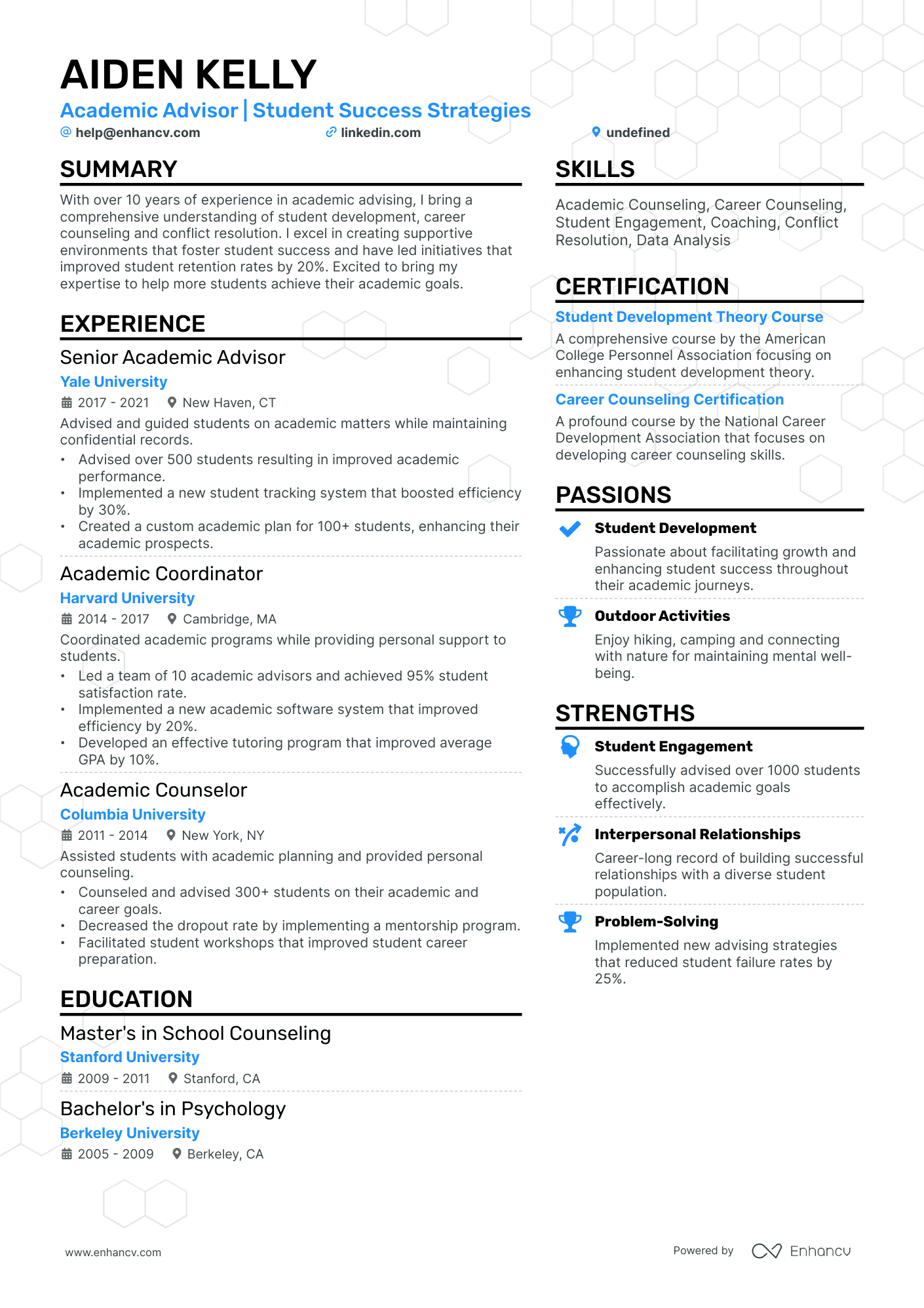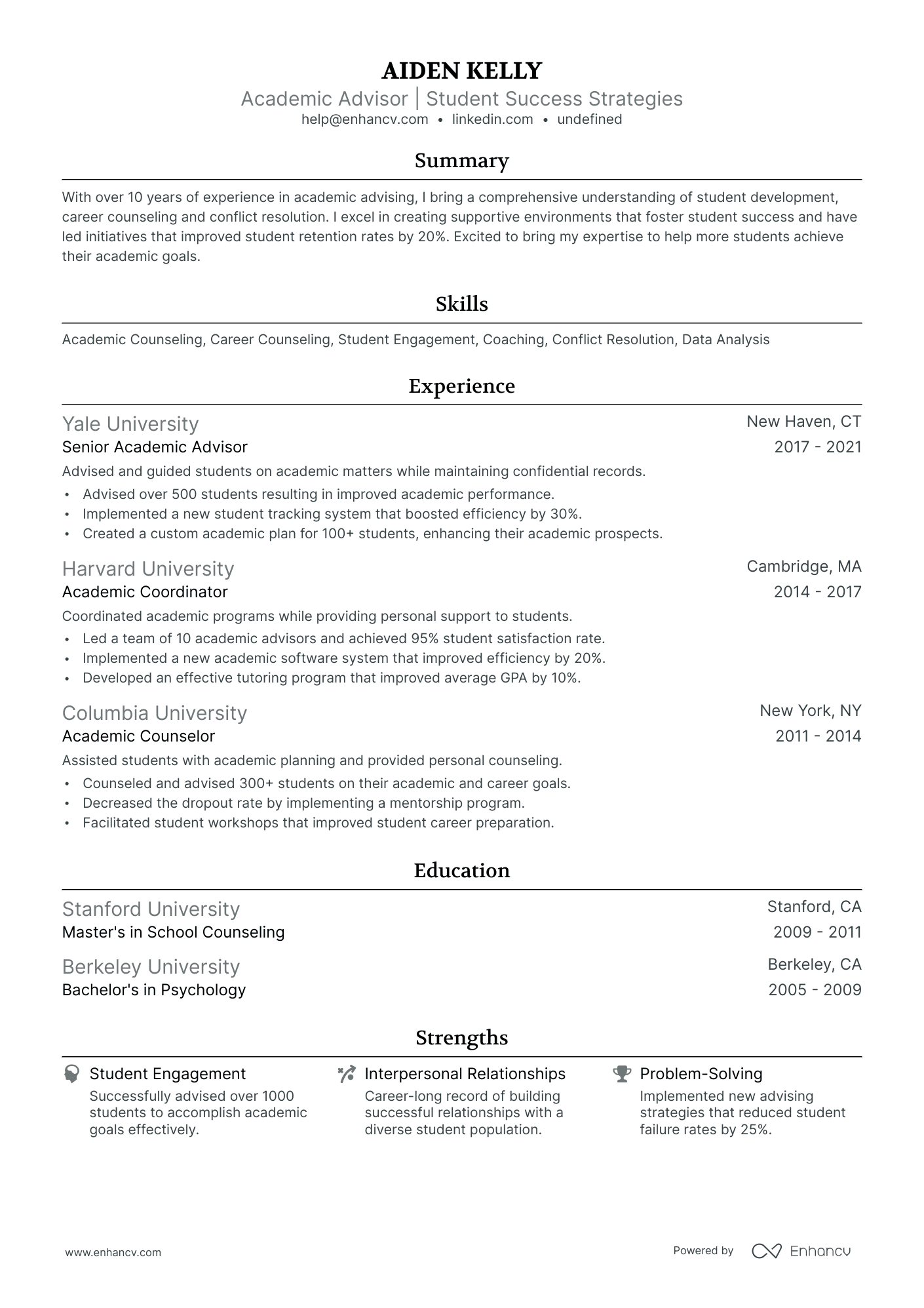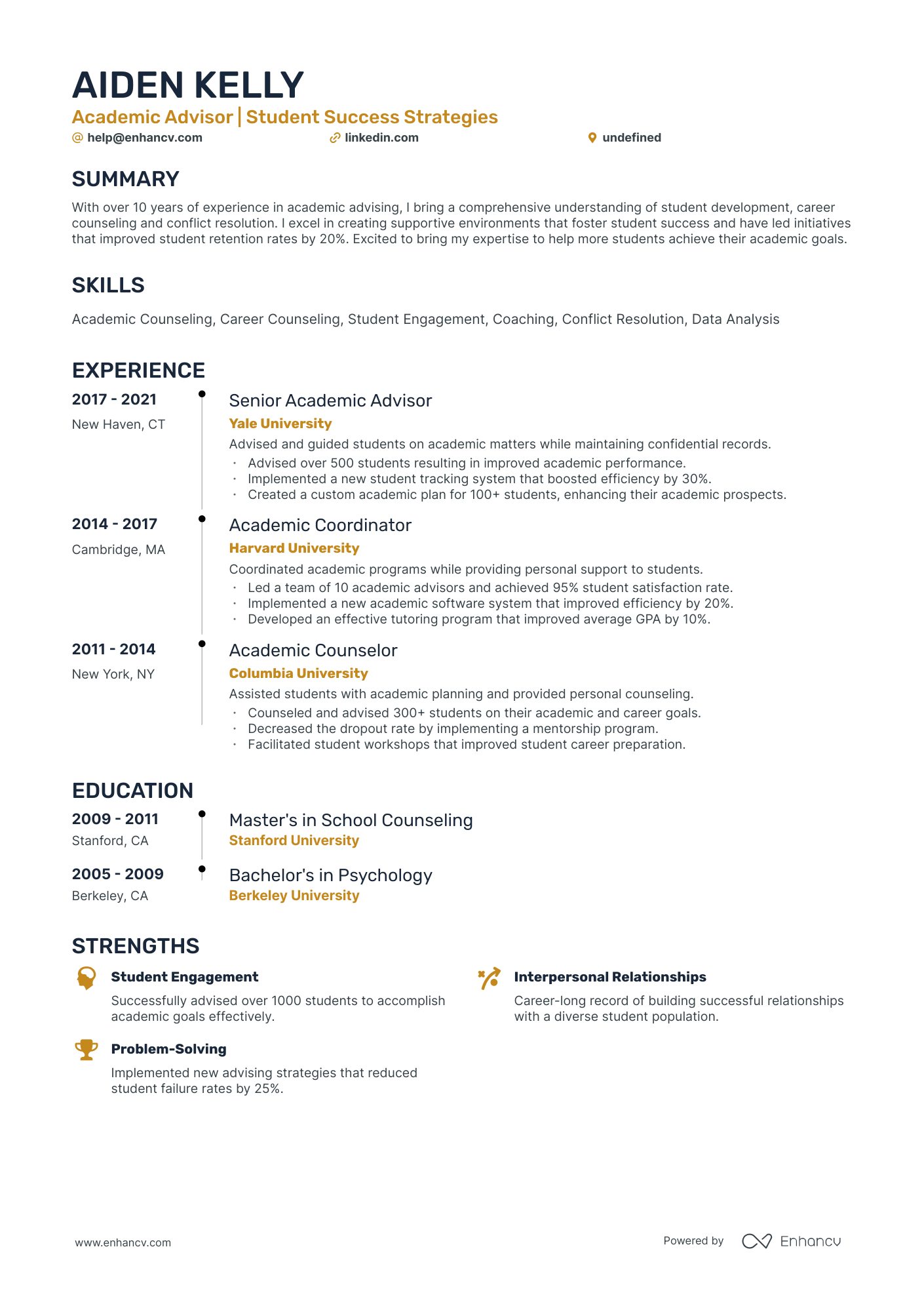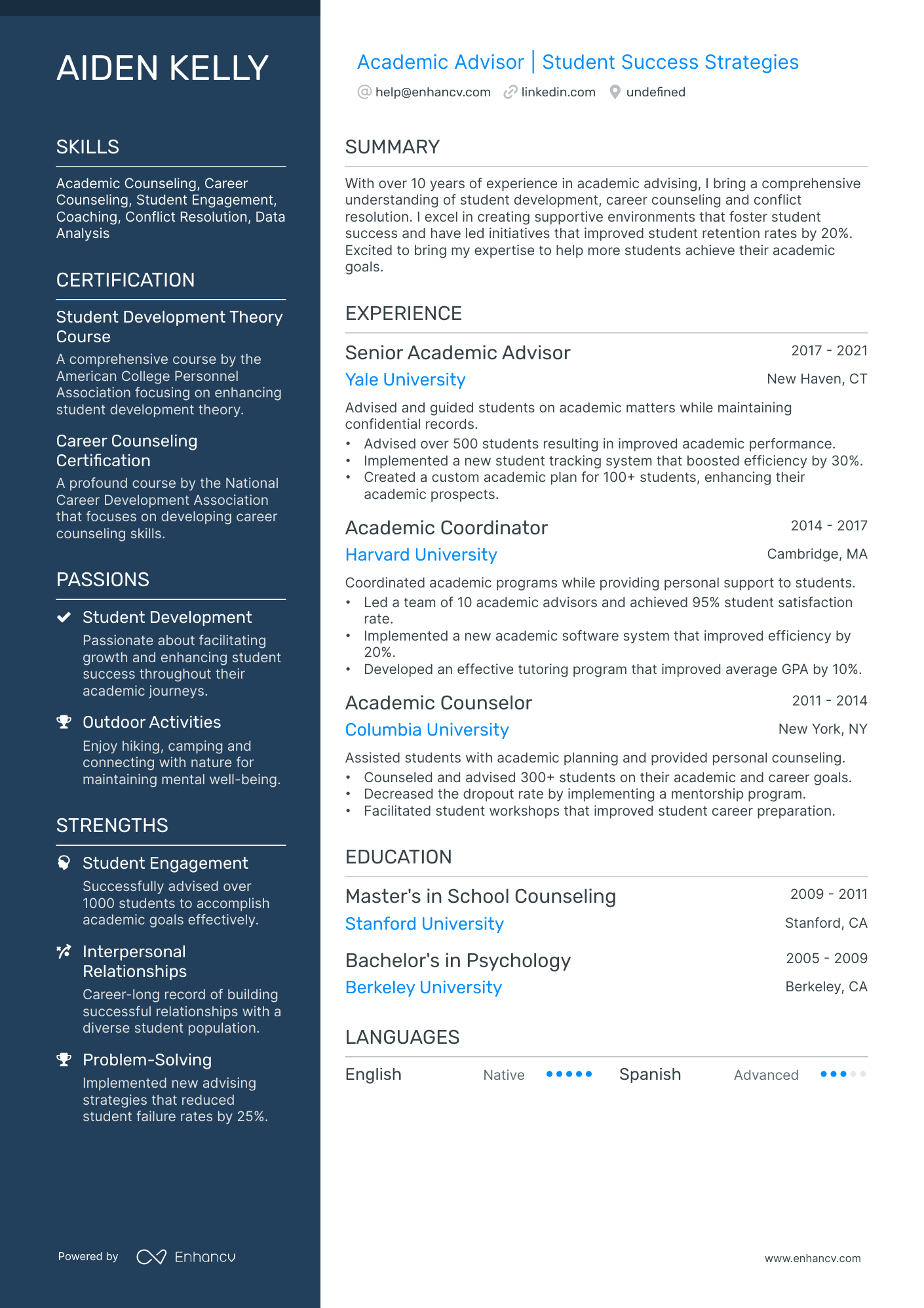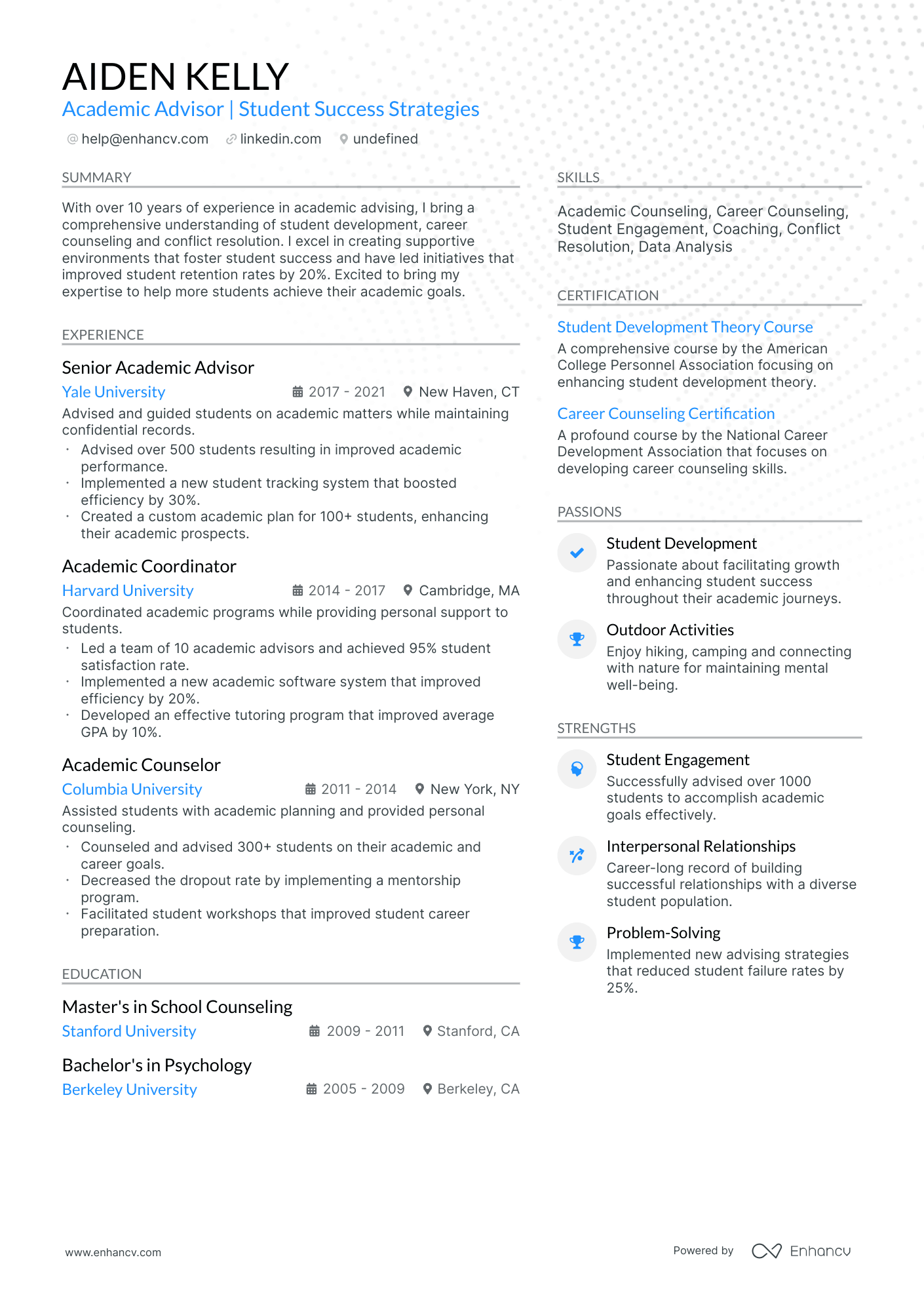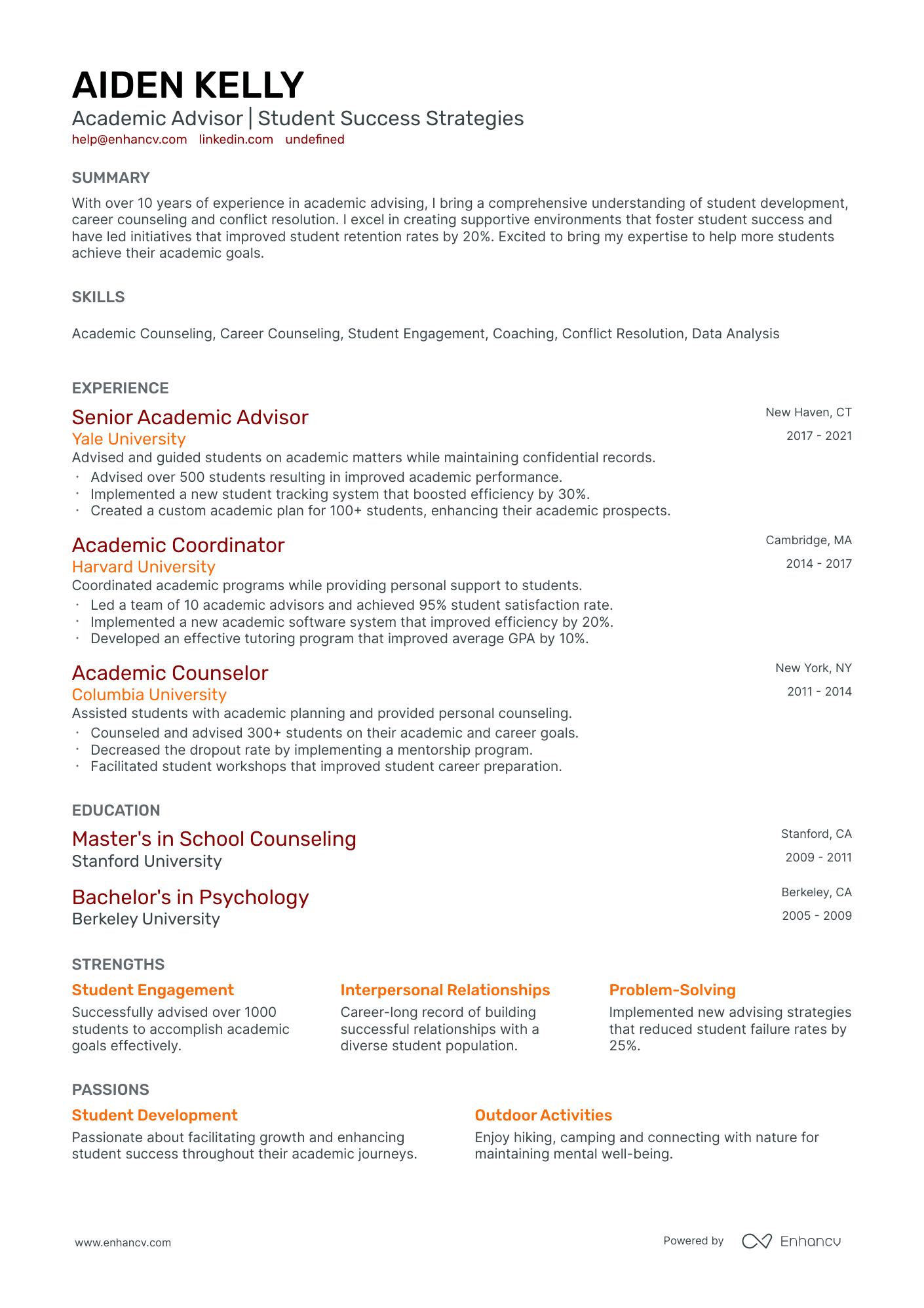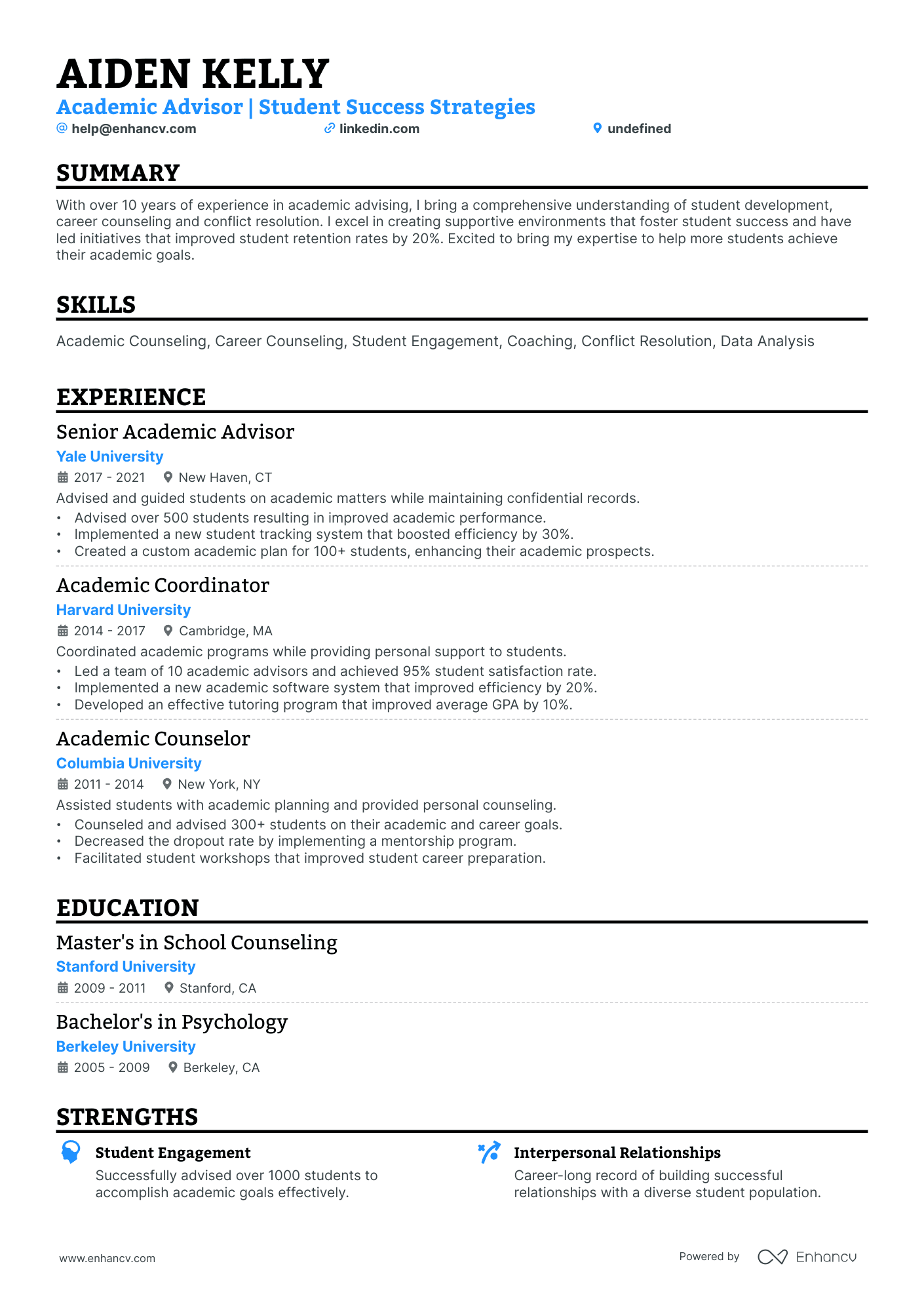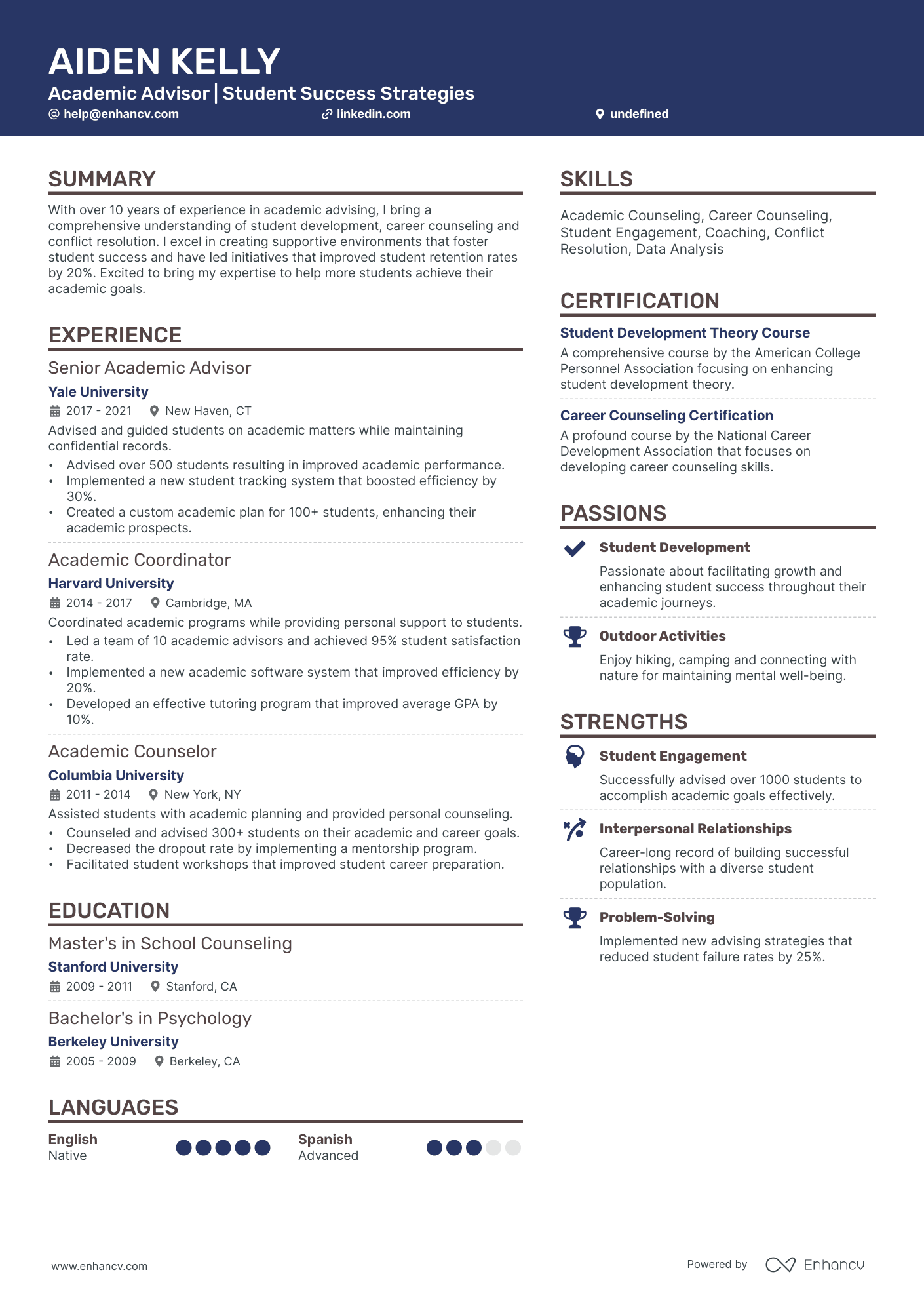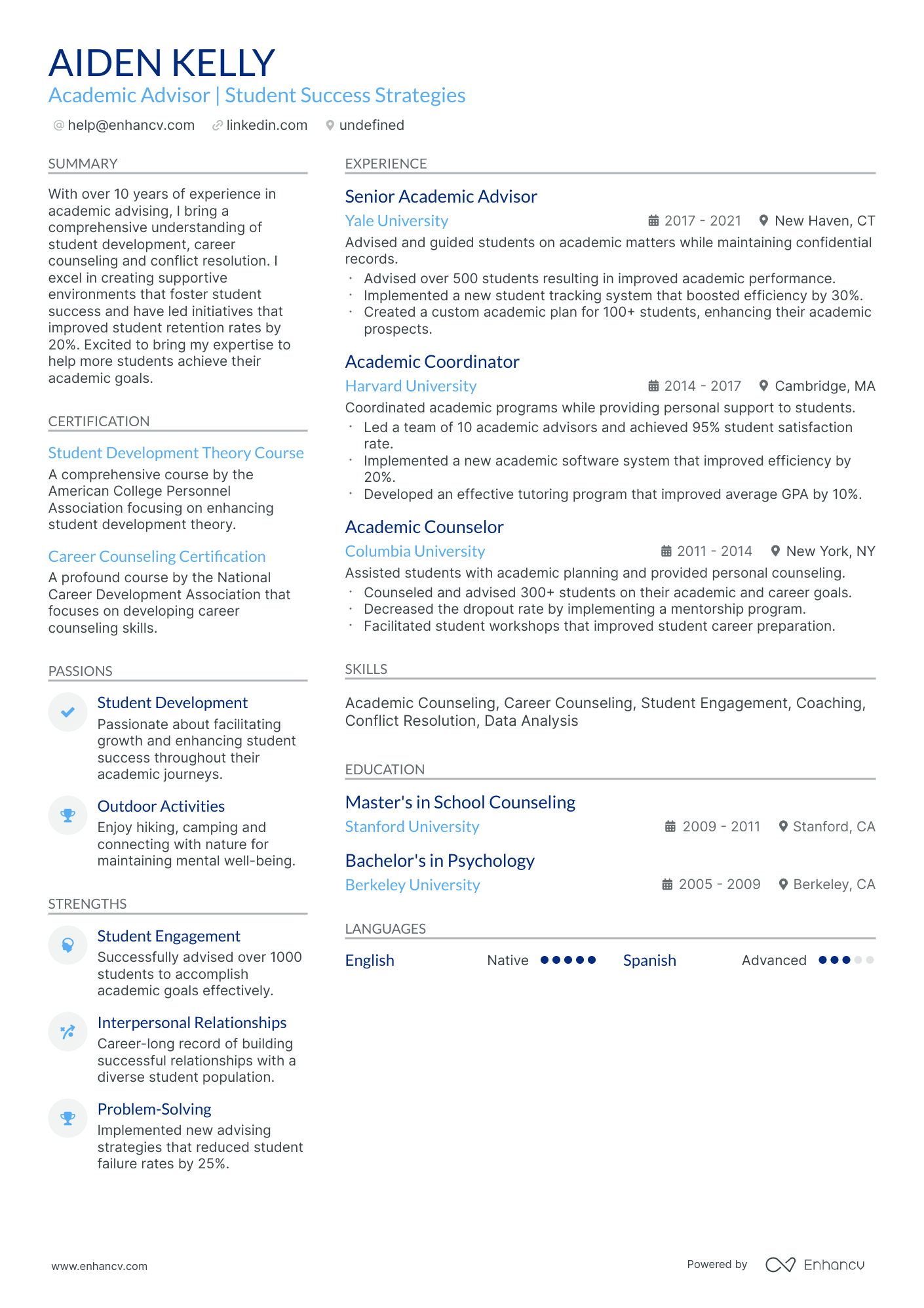Academic advisors often struggle with demonstrating the broad scope of their responsibilities, including student counseling, curriculum planning, and administrative tasks, in a succinct yet comprehensive manner on their resumes. Our guide can assist by providing specific strategies and examples for effectively summarizing these diverse roles, highlighting transferable skills, and aligning experiences with potential employer's requirements.
Dive into our academic advisor resume guide to:
- Explore top-tier resume examples, offering insights into the industry's best practices.
- Enhance sections like experience, education, and achievements with expert advice.
- Articulate your technical prowess and personal attributes, setting you apart from other candidates.
- Sharpen your focus on the distinct skills that make your academic advisor resume resonate with recruiters.
Recommended reads:
Formatting the layout of your academic advisor resume: design, length, and more
When it comes to the format of your academic advisor resume , you've plenty of opportunities to get creative. But, as a general rule of thumb, there are four simple steps you could integrate into your resume layout.
- If you have plenty of experience, you'd like to showcase, invest in the reverse-chronological resume format. This format focuses on your latest experience items and skills you've learned during your relevant (and recent) jobs.
- Don't go over the two-page limit, when creating your professional academic advisor resume. Curate within it mainly experience and skills that are relevant to the job.
- Make sure your academic advisor resume header includes all of your valid contact information. You could also opt to display your professional portfolio or LinkedIn profile.
- Submit or send out your academic advisor resume as a PDF, so you won't lose its layout and design.
Align your resume with the market’s standards – Canadian resumes may have unique layout guidelines.
Upload your resume
Drop your resume here or choose a file. PDF & DOCX only. Max 2MB file size.
Pro tip
While color can enhance your academic advisor resume by emphasizing key details like headlines, job titles, and degrees, moderation is key. Stick to a primary and a secondary color to maintain professionalism and avoid a cluttered appearance.
Essential saas account executive resume sections for a comprehensive overview:
- Header: Enables recruiters to swiftly access your contact details and peruse your latest work portfolio.
- Summary or Objective: Offers a snapshot of your career milestones and aspirations.
- Experience: Demonstrates alignment with job prerequisites and highlights your tangible contributions.
- Skills: Captures the full spectrum of your expertise, making you a compelling saas account executive candidate.
- Education & Certifications: Bridges potential experience gaps and underscores your dedication to the field.
What recruiters want to see on your resume:
- Experience in academic advising or related field
- Demonstrated knowledge of college/university policies and procedures
- Strong interpersonal skills and ability to interact effectively with students, faculty, and staff
- Evidence of strong problem-solving and organizational abilities
- Proficiency in academic advising technologies and student information systems
Recommended reads:
Strategies for crafting your academic advisor resume experience section
When detailing your academic advisor resume experience, it's essential to pair responsibilities with tangible achievements.
Consider including:
- Key responsibilities, emphasizing their significance to your role, team, or organization.
- Experiences that have fostered your technical acumen or professional growth.
- Metrics that underscore your contributions and successes.
- Challenges you've addressed and the solutions you've implemented.
- Strategies you've devised and their measurable impact on growth.
Your experience section is pivotal in making a lasting impression on recruiters. To inspire you, we've curated real-world academic advisor examples:
- Provided academic guidance to undergraduate students, assisting them in course selection and degree planning.
- Developed personalized academic success plans for students, resulting in a 15% increase in overall graduation rates.
- Conducted workshops on study skills, time management, and goal setting, helping students improve their academic performance.
- Assisted students in navigating university policies and procedures, ensuring compliance with academic regulations.
- Collaborated with faculty to identify and resolve academic-related issues faced by students.
- Managed a caseload of 200+ students, providing ongoing support and monitoring their academic progress.
- Implemented a comprehensive academic mentoring program for first-year students, resulting in a 20% decrease in dropout rates.
- Advised students on career paths and job search strategies, leading to a 30% increase in successful internships.
- Collaborated with the admissions team to streamline the transfer credit evaluation process, reducing response time by 50%.
- Coordinated academic workshops for at-risk students, providing guidance and resources to improve their academic standing.
- Developed and maintained an online resource database for students, facilitating easy access to academic support materials.
- Served as a liaison between students and faculty, fostering open communication and resolving academic conflicts.
- Assessed transfer credits and course equivalencies to ensure accurate placement and timely degree completion.
- Created academic success workshops tailored to the needs of international students, resulting in a 25% improvement in GPA.
- Collaborated with campus organizations to develop programs promoting student engagement and retention.
- Providing virtual academic advising services to remote students, utilizing video conferencing and online collaboration tools.
- Developing and implementing strategies to enhance student engagement and satisfaction in a virtual learning environment.
- Assisting students in navigating online course platforms and troubleshooting technical issues to ensure a seamless learning experience.
- Advised students on program requirements and course sequencing, ensuring timely progress towards degree completion.
- Led a team of peer advisors, providing training and support to enhance their advising skills and knowledge.
- Collaborated with faculty to develop a mentorship program, connecting students with industry professionals for career guidance.
- Developed and implemented a proactive academic intervention program targeting high-risk students, resulting in a 20% decrease in academic probation cases.
- Assessed student learning outcomes and developed strategies to enhance academic support services based on data analysis.
- Collaborated with campus departments to design and deliver co-curricular programs promoting student success and retention.
- Provided guidance to students pursuing dual degrees, facilitating seamless coordination between different academic departments.
- Designed and delivered workshops on academic integrity and plagiarism awareness, promoting ethical conduct among students.
- Implemented an early warning system to identify struggling students, initiating timely interventions and support services.
- Managed a caseload of international students, providing guidance on immigration regulations and academic requirements.
- Coordinated the integration of international students into campus communities through orientation programs and cultural events.
- Collaborated with faculty and staff to develop international exchange programs, fostering global perspectives among students.
The following content includes information from "O*NET OnLine" by the U.S. Department of Labor, Employment and Training Administration (USDOL/ETA). Used under the CC BY 4.0 license. The data represents the top responsibilities present on the task lists for academic advisor professionals.
Top Responsibilities for Academic Advisor:
- Maintain accurate and complete student records as required by laws, district policies, and administrative regulations.
- Counsel students regarding educational issues, such as course and program selection, class scheduling and registration, school adjustment, truancy, study habits, and career planning.
- Provide crisis intervention to students when difficult situations occur at schools.
- Counsel individuals or groups to help them understand and overcome personal, social, or behavioral problems affecting their educational or vocational situations.
- Review transcripts to ensure that students meet graduation or college entrance requirements, and write letters of recommendation.
- Prepare students for later educational experiences by encouraging them to explore learning opportunities and to persevere with challenging tasks.
- Refer students to outside counseling services.
- Refer students to degree programs based on interests, aptitudes, or educational assessments.
- Evaluate students' or individuals' abilities, interests, and personality characteristics, using tests, records, interviews, or professional sources.
- Provide students with information on topics such as college degree programs and admission requirements, financial aid opportunities, trade and technical schools, and apprenticeship programs.
Quantifying impact on your resume
<ul>
Addressing a lack of relevant academic advisor experience
Even if you lack direct academic advisor experience, you can still craft a compelling resume. Here's how:
- Highlight projects or publications that demonstrate your relevant skills or knowledge.
- Emphasize transferable skills, showcasing your adaptability and eagerness to learn.
- In your objective, outline your career aspirations and how they align with the company's goals.
- Consider a functional or hybrid resume format, focusing on skills over chronological experience.
Recommended reads:
Pro tip
If your experience section doesn't directly address the job's requirements, think laterally. Highlight industry-relevant awards or positive feedback to underscore your potential.
Spotlighting your academic advisor hard and soft skills
Hard skills denote your technological proficiency and expertise in specific tools or software. These skills are often validated through certifications and hands-on experience.
Soft skills, on the other hand, reflect your interpersonal abilities and how you navigate workplace dynamics. These skills are cultivated over a lifetime and can be more nuanced.
Why the emphasis on both? Hard skills demonstrate your technical competence and reduce training needs. Soft skills suggest adaptability and cultural fit.
To optimize your skills section:
- Forego basic skills like "Excel" in favor of more specific proficiencies like "Excel Macros".
- Highlight core values and work ethics as soft skills, indicating what you prioritize in a professional setting.
- If relevant, create a distinct section for language proficiencies.
- Balance hard and soft skills by crafting a strengths or achievements section, illustrating outcomes achieved through both skill sets.
To assist you, we've curated a list of skills highly sought after by recruiters. Ensure you integrate those that resonate with your expertise and the prospective employer's needs:
Top skills for your academic advisor resume:
Student Information Systems (SIS)
Degree Audit Software
Microsoft Office Suite
Data Analysis Tools
Learning Management Systems (LMS)
Career Assessment Tools
Academic Planning Software
Database Management
Online Communication Platforms
Scheduling Software
Active Listening
Empathy
Communication
Problem-Solving
Time Management
Interpersonal Skills
Conflict Resolution
Adaptability
Critical Thinking
Cultural Competence
Next, you will find information on the top technologies for academic advisor professonals from "O*NET OnLine" by the U.S. Department of Labor, Employment and Training Administration (USDOL/ETA). Used under the CC BY 4.0 license.
Top technologies for Academic Advisor’s resume:
- Blackboard software
- Microsoft Access
- ACT WorkKeys
- Counseling software
- Moodle
- Schoology
Pro tip
Sometimes, basic skills mentioned in the job ad can be important. Include them in your resume, but don't give them too much space.
Highlighting education and certification on your academic advisor resume
Your education section is a testament to your foundational knowledge and expertise.
Consider:
- Detailing your academic qualifications, including the institution and duration.
- If you're still studying, mention your anticipated graduation date.
- Omit degrees that aren't pertinent to the job.
- Highlight academic experiences that underscore significant milestones.
For academic advisor roles, relevant education and certifications can set you apart.
To effectively showcase your qualifications:
- List all pertinent degrees and certifications in line with the job requirements.
- Include additional certifications if they bolster your application.
- Provide concise details: certification name, institution, and dates.
- If you're pursuing a relevant certification, indicate your expected completion date.
Your education and certification sections validate both your foundational and advanced knowledge in the industry.
Best certifications to list on your resume
Pro tip
List your degrees in reverse order, starting with the newest. A recent PhD or unique field could set you apart.
Recommended reads:
Choosing between a resume summary or objective based on your experience
The relevance of a resume summary or a resume objective for your academic advisor application hinges on your experience.
Both provide a snapshot of your expertise and accomplishments. However:
- A resume objective emphasizes your career aspirations, ideal for candidates looking to balance their experience with future goals.
- A resume summary offers a space to detail your unique value and notable accomplishments, perfect for candidates with a rich career history.
Ensure your introduction aligns with the job description, and if possible, quantify details for a compelling narrative.
Resume summary and objective examples for a academic advisor resume
Optimize your resume summary and objective for ATS
Drop your resume here or choose a file.
PDF & DOCX only. Max 2MB file size.
Enhancing your academic advisor resume with additional sections
Make your academic advisor resume truly distinctive by adding supplementary sections that showcase:
- Awards that underscore your industry recognition.
- Projects that bolster your application's relevance.
- Hobbies, if they can further your candidacy by revealing facets of your personality.
- Community involvement to highlight causes you champion.
Key takeaways
- A clear resume layout helps present your info well.
- Use all main resume sections to show how you fit the job.
- Detail specific skills or tasks and their impact.
- Show your personality through interests or hobbies.
- List certifications to back up your technical skills.
